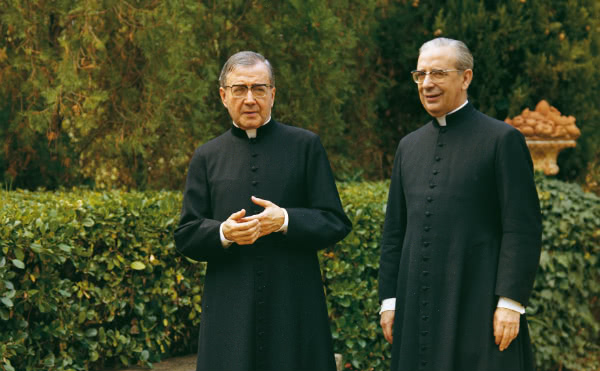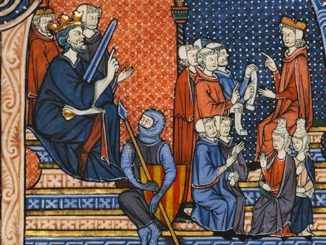
Originally published: Miguel Quesada, Círculo Hispalense
***
Opus Dei has become news. The difficulties that the institution has had with Rome for a long time – now intensified – have catapulted the work of Msgr. Escrivá to the limelight. The rigor with which the analysis of what happened is faced, as usual, is conspicuous by its absence. Thus, the «conservative» groups praise the silence and devotion with which the members of the institution face the problems – especially with regard to the Pope -, while the intra- and extra-ecclesial progressivists celebrate with joy the torpedo to an alleged Catholic «traditionalism» that Opus Dei has not embodied and will never embody.
In this regard, I would like to point out some points that I consider of interest, with no other pretense than to base the facts well for subsequent accurate and serene reflections. I refer for historical issues to the work of Andrés Vázquez de Prada (The founder of Opus Dei, 3 volumes, Madrid, Rialp, 2003).
We have to look, in my opinion, for the causes of the current problem many years ago. Opus Dei, unlike the traditional conception of the preceding religious orders, handles the idea that it was «revealed» by God to Msgr. Escrivá, that is, that the true founder of the Work would be God himself, while Escrivá would embody the «spirit of the Work» as a means to achieve the holiness of its members. Beyond the risks involved in this conception, I would like to dwell on the causes of the current crisis.
As the number of numerary members grew, Msgr. Escrivá could not meet his spiritual needs due to limitation of material time; a problem not at all negligible, since only he knew the «spirit of the Work». In fact, the members who began to confess outside the environment of Escrivá were somewhat confused, since they confessed according to the fulfillment of the «spirit of the Work», being – correctly – corrected by the confessors, since the object of the confession is sin(s).
This situation led Msgr. Escrivá to make the resolution that he needed numerary priests, who attend according to the «spirit of the Work» to the faithful, thus overcoming what the founder calls the «sacramental wall».
The first batch of numerary clergy was ordered by the then bishop of Madrid, Leopoldo Eijo y Garay, at the request of the founder. The new clergy – Álvaro del Portillo, José Luis Múzquiz and José María Hdez. Garnica – they could now dedicate themselves to helping Escrivá in the distribution of sacraments according to the «spirit of the Work».
The problem was cooking, because as Escrivá preached the lay dimension of the Work, the number of members grew and, therefore, he needed new clerics of the Work. At the same time, Opus Dei needed a legal suit. According to the intentions of the founder, it should be «tailor-made», since the lay dimension did not marry with belonging to the Work of the clerics. However, as the legal costumes changed, Escrivá’s conviction in the importance of having his own clergy did not decline, but aspired to combine it with the legal nature of the Work. We could dwell on the extravagances of the legal itinerary – it is very significant, at a certain time, the fulfillment of religious vows, relativized by the founder himself and promised as temporary to the members of that time – but I think it would distract us from our subject.
Finally, in the pontificate of John Paul II, whose effusive enthusiasm for approving groups was inversely proportional to the rigor of their respective examination, came the fulfillment of what in the Work was called the «special intention». The personal Prelature met the expectations of the Work, by allowing them a not insignificant margin of discretion, being comparable to a kind of diocese not limited to a certain territory. However, this solution raised problems obviated by the Work that are the basis of its current crisis, and that we will briefly list:
1-The desire for control of one’s own clergy reached derisory extremes, reaching the approval of statutes in which it was affirmed – and it is affirmed, since they remain in force – that «with respect to priests incardinated in the Prelature, the Prelate’s power of governance is full in both the internal and the external forumthe power». Disorderly affirmation, given that full jurisdiction over the internal jurisdiction is contrary to the entire Catholic tradition (de internis neque ecclesia).
2-The role of the laity is ignored, since the Code of Canon Law affirmed, and with the reform of Francis it is emphasized, that the members of the Prelature are clergy, being possible participation in the apostolates of the latter by lay people, which does not amount to a canonical belonging. It seems that the desire for one’s own clergy was left to the laity along the way.
3-The jurisdiction of the clergy, and the extensive modo suo interpretation of the laity («for lay persons incorporated in the Prelature, his power of governance extends only to what concerns the particular end of the Prelature», affirm the statutes), slips a break with the canonical legal tradition, linked to the diocesan institution. The cheerful characterization of the Prelature, as well as the confusing internal interpretation, would imply that any group with such a nature born a few years ago acquires jurisdiction over the secular, which rests in the ordinary of the place. Reality that, canonically, does not imply the Prelature, since its members are clergy, but that has been conveniently underlined to avoid abusive interpretations.
4- Jurisdictional problems were discreetly addressed in the Motu Proprio Ad charisma tuendum (July 14, 2022), which amended articles V and VI of the Apostolic Constitution Ut sit (November 28, 1982). The well-founded justification of the modification was based on the charismatic dimension that Francis gave to Opus Dei, a refined way of separating them from the hierarchical structure of the Church by transferring the dependence of the Dicastery of the Bishops to the Dicastery of the Clergy. Thus, the reference to the current «clericalization», used internally to downplay a fact that has it, lacks basis, since the original dependence It was from the Dicastery for the Bishops.
I believe that these considerations help to dispel the haze of confusion that looms over the crisis of the Work. The modification is, therefore, founded, because the Church finds a hierarchical structure of an apostolic nature, which cannot be subjected to the new foundations of new groups of then and now. Personal Prelatures based on the originality of charism pose such a risk, even more so when the charism of the Work is as generic as the universal call to holiness, the truth of the Church of all time that no one has invented.
The ideological reasons that have been able to encourage the contemporary curia in the modification of the institution are, in my opinion, irrelevant; it is, on the contrary, about saving the canonical tradition of the Church from the confused movements that were baptized to simulate a post-conciliar spring that never arrived.
The paradoxes of Providence have encouraged that it is the Pontificate of Francis, governed by the mature chaos of previous confusing approaches, that puts order in the chaotic world of post-conciliar approvals. God, without a doubt, has a sense of humor.
Miguel Quesada, Círculo Hispalense




Deje el primer comentario